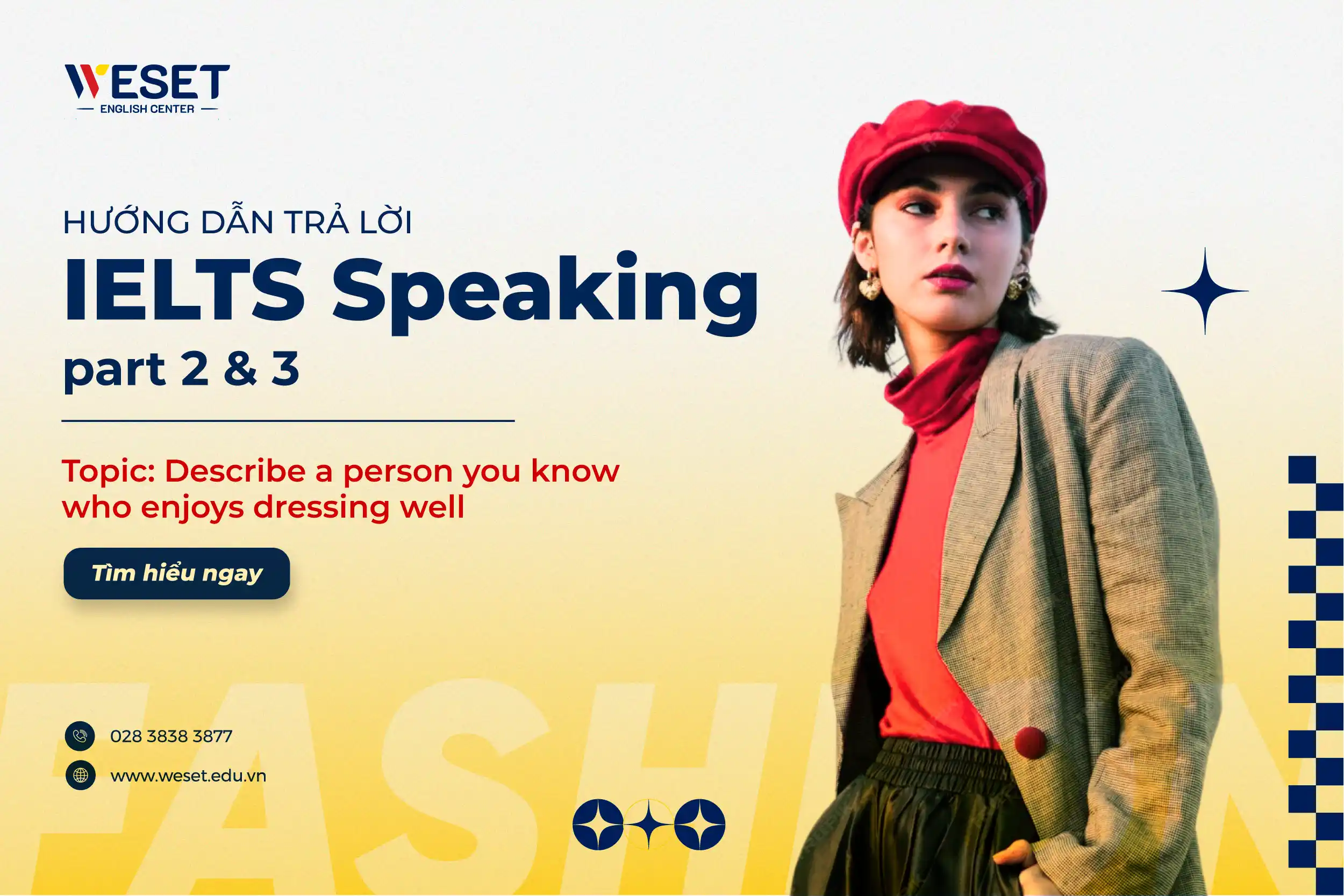Trang chủ Blog Bài thi IELTS mẫu IELTS Speaking: Describe a person you know who enjoys dressing well
IELTS Speaking: Describe a person you know who enjoys dressing well
- WESET
- Bài mẫu IELTS Sample Speaking, Bài thi IELTS mẫu, Blog, Blog IELTS
MỤC LỤC
Thời trang được coi như một loại ngôn ngữ không lời trong cuộc sống. Nhưng không phải ai cũng “nói thông thạo” vì sẽ có người phối đồ rất đẹp và có người chỉ ở mức tạm ổn. Hôm nay hãy cùng WESET biết đến một người có “gu” thời trang là như thế nào qua đề Speaking part 2 & 3 này nhé!

Đề IELTS Speaking part 2&3 – Mô tả một người mà bạn biết có phong cách ăn mặc đẹp
IELTS Speaking part 2: Describe a person you know who enjoys dressing well
You should say
- Who the person is
- What job/studies the person does
- What sort of clothes the person wears
- And explain why you think this person enjoys dressing well
Sample
| Who the person is | There’s one person that I’ve looked up to in the past few months, her name is Anna Bey. She’s well known by the youtube community for her elegant lifestyle, which is demonstrated through the way she dresses. |
| What job/studies the person does | She’s a styling coach who offers videos on how to, generally, lead an elegant life. It may sound a bit materialistic or pretentious to those unfamiliar to her channel or the so-called “elegant lifestyle”, for this term’s often associated with the upper class. The truth is, it has nothing to do with wealth in order to pursue this sort of lifestyle, and that’s what really aligned with my view. |
| What sort of clothes this person wears | Anna is an avid supporter of sustainable fashion. That means she only buys and wears items that are made out of durable fabrics such as cotton, linen, wool, with very little to no polyester at all. She always goes for well-made garments, in neutral tones preferably, to create a capsule wardrobe. |
| And explain why you think this person enjoys dressing well. | As to why Anna’s so fashionable, nothing boosts her mood faster than wearing a nice and decent outfit. Putting effort into her looks also builds up her confidence that radiates and sets her apart in any social situation. |
IELTS Speaking part 3
1. Do you think online shopping will replace in-store shopping in the future? Why?
Although that is very much likely, there will always be a small demand for physical stores, in the beauty and fashion industry for instance. You see most times, no matter how accredited a fashion store is, women naturally want to try clothes on to see if it’s flattering on them. Or considering the no-return policies for specific products, let’s say electronic devices, customers will have to check them firsthand in-store, for any defect so as not to squander their money.
2. Are older people as fashionable as young people? Why?
Hmm, I would say no. Historically speaking, gen Z and later generations were born in a peaceful age, hence they appreciate the greater joys in life such as catching up with latest fashion trends. Not to mention the early exposure to technology, from which they gain access to the unlimited resources to be stylish, let’s say online shopping and fashion tips.
3. Are women more fashionable than men? Why?
There’s no doubt about it. Whether you like it or not, looks are of greater importance to women than men. The feminine obsession of appearance is socially learned, through how attractive women have it much much easier than average-looking ones. Along with promotions of fashion trends targeted at the female audience, their spending huge effort and money on clothes is totally understandable.
New words and phrases
Part 2
- Look up to (phrasal v): Ngưỡng mộ, coi trọng ai đó
- Materialistic (adj): Thực dụng
- Pretentious (adj): Kiêu căng, trịch thượng
- So-called (adj): Gọi là, dùng khi giới thiệu một thuật ngữ chưa phổ biến với nhiều người → “the so-called elegant lifestyle”: cái được gọi là phong cách sống tinh tế
- Be associated with sth: Được gắn liền với gì đó
- The upper class (n): Tầng lớp thượng lưu
- Have sth to do with: Liên quan đến → “have nothing to do with” là không liên liên quan gì đến
- Be aligned with: Phù hợp với
- Avid (adj): Say mê, cuồng nhiệt → avid supporter / fan
- Sustainable (adj): Bền vững
- Durable (adj): Bền
- Go for (phrasal v): Chọn lựa hoặc yêu thích một thứ gì
- Garment (n) (formal): Món quần áo
- Preferably
- Capsule wardrobe (n phrase): Tủ đồ không có quá nhiều quần áo nhưng các món có thể phối với nhau dễ dàng thành nhiều set trang phục có thể mặc hàng ngày
- Radiate (v): Thể hiện một phẩm chất tốt đẹp nào đó
- Set sb apart (phrasal v): Khiến ai đó nổi bật
Part 3
- Accredited (adj): Có tiếng tăm, uy tín
- Flattering (adj): Làm ai đó trông đẹp, cuốn hút hơn bình thường
- Firsthand (adv): Tự mình
- Defect (n): Lỗi, hỏng hóc
- Squander (v) money: Tiêu tiền hoang phí
- Not to mention (that) (idiom): Chưa kể đến
- Exposure (n): Sự tiếp xúc
- No doubt (phrase): Chắc chắn
- Whether you like it or not (idiom): Thích hay không thì (dùng khi đề cập một tình huống không mấy dễ chịu nhưng không thể thay đổi nó)
- Average-looking (adj): Ngoại hình bình thường, không nổi bật
- Understandable (adj): Dễ hiểu (về hành vi của một ai đó trong tình huống cụ thể)
Có thể bạn quan tâm
IELTS Speaking: “Describe something important that you lost in the past”
IELTS Speaking: Describe a time when you missed an appointment






